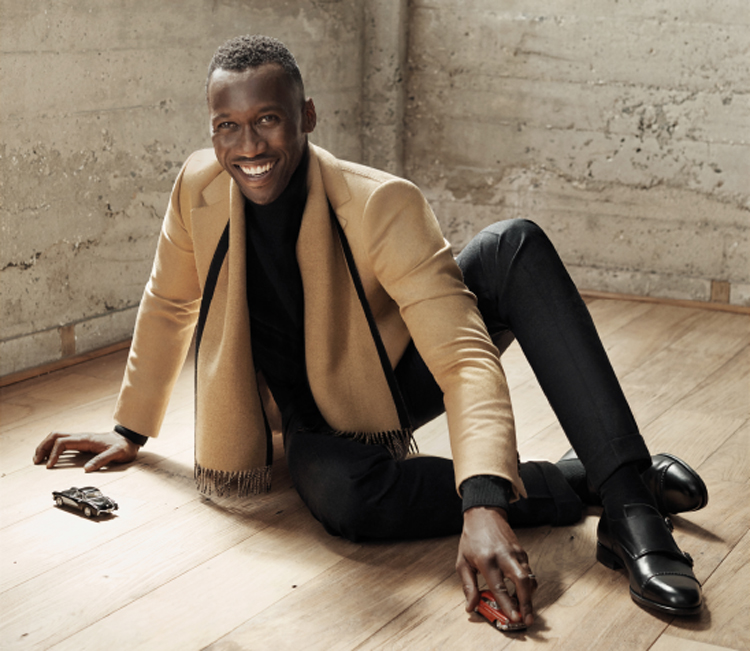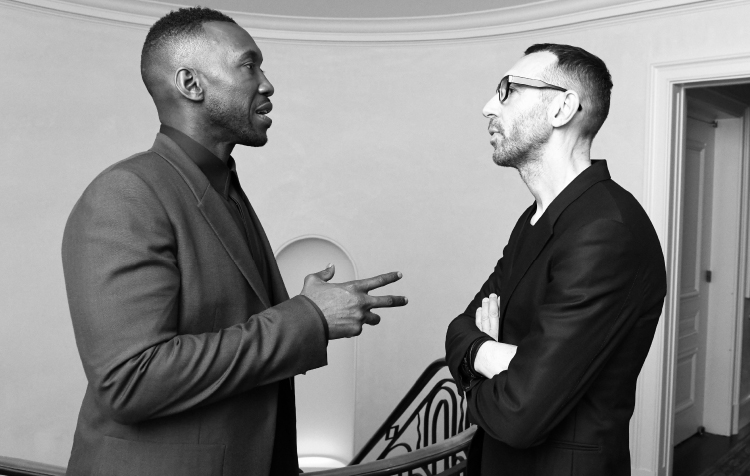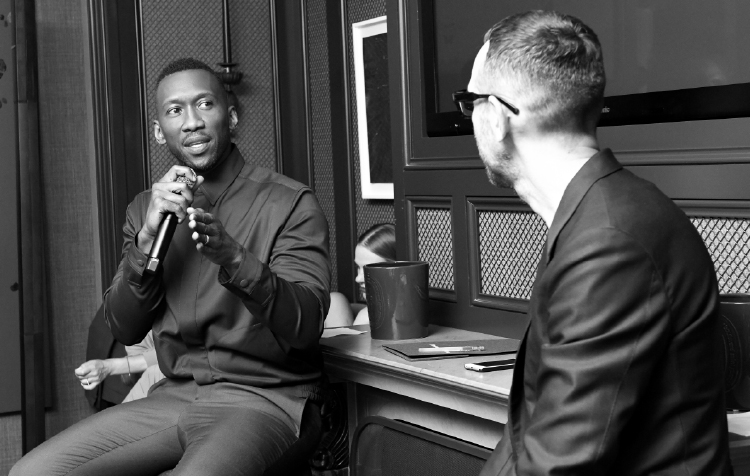Oscar winning actor Mahershala Ali talks exclusively on his collaboration with Ermenegildo Zegna, how he would define himself as a man and his upcoming projects

As Ermenegildo Zegna debuted it’s latest campaign What Makes a Man, in New York last month all eyes were on Oscar winner Mahershala Ali who, along with Chinese singer and songwriter Nicholas Tse, is the face of this eye opening project.
What better choice than Ali as the face of the campaign? Ali has won two Oscars for his roles in hit films Green Book and Moonlight and is a hugely versatile actor, he has depicted and embodied many shades of masculinity through the roles he has played and he openly talks of his wish to raise awareness and have a positive, productive impact on those around him. Ali was even named one of the 100 most influential people in the world in 2019 by Time magazine. It was this, paired with his unique sense of style that made Ali a a natural fit to represent the idea of what a man is today and partner with the legendary luxury menswear brand.
Growing up in Hayward California, Ali was inspired by his father who himself was an actor on Broadway, but it wasn’t until after his graduation that Ali became interested in acting. In 2000 the actor converted to Islam and has spoken many times about raising awareness of discrimination against race and religion. As we sat down with him in New York he was keen to open up on how he would define himself as a man and how he hopes to inspire others with his choices.

What are the common codes that you find between you and a brand like Zegna?
What I love about Zegna is that they have a real attention to detail and a focus on quality and I think that’s why they’ve sustained themselves for over a century. For me, I don’t always necessarily feel like the person who’s the loudest or coolest or biggest, but I do want to be consistent and I want to always be uniquely myself and true to myself and I feel like there’s a great deal of alignment with how I approach my work and how the team at Zegna approach theirs.
I got to visit the headquarters in Trivero a few months ago and I was blown away by how everything goes all the way back to the start and how they are able to make all the products in one place and bring that to market. It’s really incredible to me. There’s a sense that they are a very small, intimate company, but a very large company at the same time and in some ways I think the work that I do and the projects I’ve been able to be a part of can be small and very intimate but still have a global reach and impact. Green Book was actually a small movie. It was going to have an independent financer and even though we ended up getting support from a studio later, it actually was a relatively small film. They don’t really even do films of that budget that often these days and it was something that ended up having a global impact. Moonlight was another really ‘small’ project. We had very little money for the film but it was still a film that had a large and somewhat global impact. So I think there is a lot of parallels between some of the choices I’ve made in my acting work and this choice to work with Zegna and vice versa.

What do you understand of the message of What Makes a Man, is the concept of masculinity something you want to address?
First of all what drew me to work with Zegna was Zegna as a brand. It is clearly articulated and they have a larger agenda that they were looking to achieve with this campaign, that was already in alignment with the work that I do. Some of my favourite actors – Philip Seymour Hoffman, Daniel Day Lewis – they are transformational actors. You can’t be a transformational actor and play the same man in every role. So if you’re going to dare to sign up to be in this business, you have to work to transform and allow yourself to literally step into the shoes of another human being. I always look to tackle a wide range of characters, I’m ok with characters and parts that have small similarities but I really want to play different people. So what Zegna was expressing about opening up a conversation about masculinity and speaking to the wide range of people out there in the world, it just didn’t feel like a disruption to anything that I was already doing naturally as an actor. So it felt like a nice fit.
How would you describe yourself as a man and if there was one thing about yourself that you would change about yourself what would it be?
I’ve always been very concerned with things like movement, growth, expansion and range. Because I think anything other than that is staying in one place and becoming stagnant and unevolved and I want to evolve. I think I’ve had a lot of experiences, I’ve been around so many different kinds of people and I’ve learnt a lot from the people I’ve been around and the experiences I’ve had, so I think I would pride myself on being open and conscious and willing to listen and learn.
What I would like to do better is at times, the responsibility of it all can become dizzy, if that makes sense, because you can get pulled in so many different directions and so I think managing all the different tasks and responsibilities – whether I’m an actor or a lawyer – managing the diverse array of responsibilities is something that I want to make sure my energy feels healthy to take on. Sometimes I have to stop what I’m doing and take a bit of a break. I haven’t technically filmed in a year because I’m very conscious of the need to re-calibrate and to balance my life. So I think if anything, I wish the balancing of it was easier, but then again I don’t know how that happens, so then it goes back to just accepting what things are and embracing it and being the best within what it is your managing and dealing with. So some of the things that I would like to improve, I don’t know how quickly that’s going to happen!
How did the success of Moonlight and Green Book change your life?
I think we’re all searching for fulfilment and I think the jobs that I’ve been able to do over the course of the last several years have changed and impacted my life as they have led to more opportunity. With having more opportunity and access, you can locate the thing that you’re looking for and that gives you some sort of fulfilment that resonates with you on a deeper level. Not just financially but in terms of what you want to say as an artist. Perhaps you’re not an artist and you work in the corporate world and an opportunity allows you to locate that thing within yourself and really connect with what is outside yourself and work towards that, because in your mind you believe that there is this thing that’s going to allow you to feel whole. So I think with more opportunity it has affected my hope because I am working to be fulfilled holistically in every aspect of my life and the acting work is one aspect of that, but it is impacting me because of the opportunities and choices it leads to. But I have to be responsible and wise with those choices in order for them to do what I envision them doing.
What has changed in cultures and society in the United States in the last few years in relation to racial prejudice and how can movies and fashion help to form an equal society?
I don’t know if racial relations change that quickly. This is something that is in the DNA of our world and America – the struggle for equality, thoughts of supremacy and inferiority – these things are global in scale – how it rears its head in America is just specific to America, but it’s global. I do think storytelling specifically can contribute to impacting awareness for everyone. Because when you become aware of an unhealthy type of behaviour that’s the only way that you can make changes. I think having personal connection with people through storytelling is a major component in impacting how people think about other races, cultures and people.
Fashion is important because there isn’t a lot of space in fashion for people who look like me. And so to have an African American man as a brand ambassador and the lead of a campaign like this, it has to have an impact. I’m not saying that it’s going to stop people from being racist, but the fact that it didn’t exist before and it exists now, it has to create a moment, a pause for people, until eventually we see a communal effort towards correcting our world and how we think of each other. I happen to be Muslim and African American, so the oppressions and problems that I’ve experienced are specific to who I am, but someone else will be affected by things that are problematic for them. So I think we can all join in this conversation about the healthy world we want to have, but we can also all relate to having not felt it in our own lives as well.

How would you define your style and who were you inspired by when you were growing up in terms of fashion?
Growing up I always looked up to my father who was very fashion forward and I always felt like he was five years ahead of his time. I started cutting hair as a young kid when I was about 12 as my mum was a hair stylist. So between hair and clothes, I felt like you could say so much about yourself. I’ve always been relatively introverted so fashion was always a voice for me. In terms of race, I was always conscious of how being black, was something that was going to speak for me before I could open my mouth. So when it came to my choices in terms of fashion, I wanted them to accurately speak for me if I wasn’t going to get a chance to speak for myself. So my father really impacted on me in that way. I felt like his style was extraordinarily cool and he was always making me aware of things that I would otherwise have had no idea about.
I also looked and certain musicians – the hip-hop culture was very influential on me. I remember watching certain looks evolve as artists evolved. I always sort of had my own dialect and my own sense of what was cool. One of the things I noticed early on, growing up in the San Francisco area – I would come to New York for the summers and I would dress differently because I could and I could take chances that I didn’t feel would necessarily resonate in my area, but in New York I could go to Harlem or Downtown and I would just see this whole range of style and fashion. So it made a difference in terms of, even with the clothes I had, how I put together combinations. One of the first things I learned how to do as a kid was match clothes and colours and textures. Once you learn the rules of matching and what goes together, then you learn how to break it up and intentionally not match. That was just something that I think was part of my culture and black culture – how you step out of the house, because so often you know that you’re not going to get that job unless you’re dressed to the nines. So I grew up with that awareness and always tried to pride myself on how I dressed because I already knew that I would be looked at in a certain way and that has never really left me. I don’t know if it’s necessarily a positive thing but it is a reaction to a form of discrimination and how a lot of black people respond to that discrimination is that they are very conscious of how they put together clothes.

What do you say no to?
I say no to anything that isn’t productive. Whether it’s a job or a conversation. I believe in what is productive and what is unproductive rather than what’s positive and negative. If something doesn’t push something forward then it’s not productive. So in terms of my work and roles, it’s not so much about is this a positive or negative character it’s more about asking if it is a contribution that is in some way, shape or form going to be productive and therefore if it’s productive it’s positive.
What is a life lesson that you can share with us?
To listen. I think you have to holistically listen. Listen to your life signs, because I think we all get signs in life. We get information in ways that tell us ‘that is not the direction for me or that is the direction for me’, whether it be a letter from your teacher that says ‘I don’t know what you’re doing after graduation but you should really think about acting’ – which I got, and listening to that, to perhaps being in a relationship when you’re getting red flags and signs that this is not sustainable and being able to listen to that. We put a lot of value on what it is that we have to say, but I don’t know if we put enough value on being more porous and observing and learning and reacting to what we hear and see. So I’m trying to become a better listener.

How do you feel about being on so many best dressed lists?
I feel inspired and humbled by it. It’s always nice to be in the conversation of men who are conscious about what they put on. Because at the end of the day we all wear things that are a direct reflection and expression of our deeper selves and that can come up in so many ways. Whether it’s high fashion or street wear, we have so many different qualities and attributes and we need a diverse range of garments and items to speak for us. You don’t have conversations with most people in the world that you see every day, but you know a little bit about a person by just how they’re dressed. So just being in those conversations or being selected as best dressed makes me very grateful for the companies that I’ve had relationships with, in this case Zegna who I’ve been on the best dressed while wearing their clothes a few times! So that makes me very grateful to have that relationship with people who have been so supportive with me and my work.
Does media matter to you?
Yes, media certainly matters, I think it’s so woven into the fabric of our lives. I think at a certain time media was just news, but now the way entertainment, fashion etc. are so deeply intertwined with media – I don’t think there is any separation to the impact of media on our culture.
I think anywhere where people can see themselves or see attributes, matters. We can learn from other people’s journeys through these types of media. Television and film are a stage for the human condition to be on display, so if the story is productive, then we can take something from seeing the human condition on display, in the format of story, so that we can perhaps learn or aspire to be like that, or know to stay away from being like that. So I think it’s incredible. Storytelling has been around forever – it was on the walls of caves – so I definitely think that it’s important and I want to make sure that my contributions are the best they can be by doing films that leave an impression on people and positively impact their lives.
Are you working on any new movies?
I’m doing the new Blade movie for Marvel which is a few years away but I’m really excited about that job, I haven’t had the opportunity to do an action movie ever, well I have been in a couple of action projects but I always died before the action started! I can’t die in this one, so I’m really excited about that. There’s a show I love called Ramy and I was recently able to connect with the writer and star of the show Ramy Youssef and I’m going to do a few episodes for the second season which will be a lot of fun. Again it’s related to diversity and it’s very different from anything I’ve had the opportunity to do so far.
What are you excited about for the next year ahead?
I’m excited about doing some production work and putting a few films together and some television for HBO that I’m producing on. So there’s a handful of projects on the way that we’re really making progress on. I’m really looking forward to that.
Interviewed By Lara Mansour Sawaya
READ MORE:
Zegna Launches What Makes a Man Campaign
Skating into Autumn/Winter 2019 with Ermenegildo Zegna XXX’s Cool Collection















